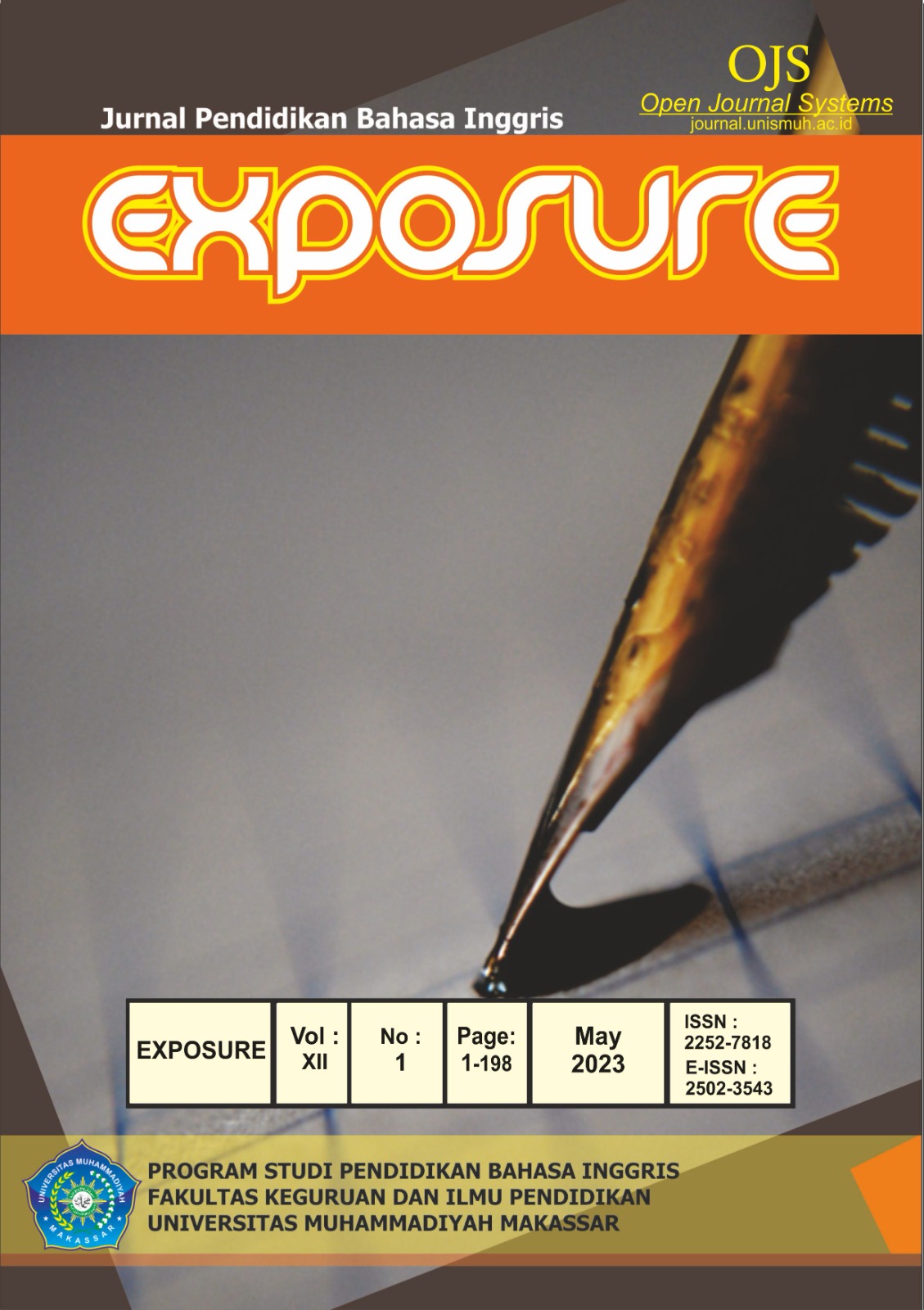INVESTIGATING EFL STUDENTS’ SPEAKING ANXIETY : A CASE STUDY AT ENGLISH DEPARTMENT OF UINSU
DOI:
https://doi.org/10.26618/exposure.v12i1.10659Kata Kunci:
Speaking, Anxiety, Foreign Language, Spoken English.Abstrak
Anxiety about speaking English has received a lot of attention in recent years. The purpose of this study was to describe the factors that caused students' language anxiety and their strategies for reducing anxiety in speaking english at class. Participants in this study were 5 students’ English department in the second semester. The methods used in this study were descriptive and qualitative. Data were obtained from interviews and observations. The results show that EFL students in English Department of UIN Sumatera Utara, they feel anxiety in speaking English. Fear of speaking English is due to a number of factors, both internal and external. The first factor was the type of the task, fear of making mistakes, the role of the language teacher, self-perception and the last is the limited exposure to English. The finding of this study also revealed that there were some strategies they used to reduce anxiety. There are preparation before speaking English, positive thinking, and strategy they used was peer seeking.Referensi
Ansari, M. S. (2015). Speaking Anxiety in ESL/EFL Classrooms: A Holistic Approach and Practical Study. International Journal of Educational Investigations Available Online @ Www.Ijeionline.Com, 2(4), 38–46. www.ijeionline.com
Çağatay, S. (2015). Examining EFL Students’ Foreign Language Speaking Anxiety: The Case at a Turkish State University. Procedia - Social and Behavioral Sciences, 199, 648–656. https://doi.org/10.1016/j.sbspro.2015.07.594
Damayanti, M. E., & Listyani, L. (2020). AN ANALYSIS OF STUDENTS’ SPEAKING ANXIETY IN ACADEMIC SPEAKING CLASS. ELTR Journal, 4(2), 152–170. https://doi.org/10.37147/eltr.v4i2.70
Darmawan, Alam, S. P., & Nirma, O. N. (2021). Speaking Self-Efficacy of EFL Students of Pre-Service Teaching Program in EFL Classroom Setting. JET (Journal of English Teaching), 7(2), 150–162. https://doi.org/10.33541/jet.v7i2.2582
Fauzi, A. A., Putri, D., & Rahman, T. (2021). STUDENTS’ ANXIETY OF SPEAKING ENGLISH IN PUBLIC.
Hanifa, R. (2018). Factors generating anxiety when learning EFL speaking skills. Studies in English Language and Education, 5(2), 230–239. https://doi.org/10.24815/siele.v5i2.10932
Liu, M. (2018). Interactive effects of English-speaking anxiety and strategy use on oral English test performance of high- and low-proficient Chinese university EFL learners. Cogent Education, 5(1), 1–14. https://doi.org/10.1080/2331186X.2018.1562410
Mulyono, H. (2019). An Investigation of Factors Contributing to Foreign Language Speaking Anxiety among International Students in Indonesian Universities. Register Journal, 12(1), 13. https://doi.org/10.18326/rgt.v12i1.13-27
Mulyono, H., & Saskia, R. (2021). Affective variables contributing to Indonesian EFL students’ willingness to communicate within face-to-face and digital environments. Cogent Education, 8(1). https://doi.org/10.1080/2331186X.2021.1911282
Pahargyan, T. (2021). STUDENTS’ ANXIETY IN SPEAKING ENGLISH DURING DISTANCE LEARNING. UC Journal: ELT, Linguistics and Literature Journal, 2(1), 1–13. https://doi.org/10.24071/uc.v2i1.3240
Rajitha, K., & Alamelu, C. (2020). A study of factors affecting and causing speaking anxiety. Procedia Computer Science, 172, 1053–1058. https://doi.org/10.1016/j.procs.2020.05.154
Sho, K. (2020). Comparison of a videoconferencing intervention’s effects on students’ english-speaking anxiety. Proceedings of 2020 IEEE International Conference on Teaching, Assessment, and Learning for Engineering, TALE 2020, 530–535. https://doi.org/10.1109/TALE48869.2020.9368401
Sholikhi, ad. (n.d.). Students’ Speaking Anxiety at ESP Classroom (A Descriptive Study in Business Administration Classroom). https://www.researchgate.net/publication/358646696
Tridinanti, G. (2018). The Correlation between Speaking Anxiety, Self-Confidence, and Speaking Achievement of Undergraduate EFL Students of Private University in Palembang. International Journal of Education and Literacy Studies, 6(4), 35. https://doi.org/10.7575/aiac.ijels.v.6n.4p.35
Unduhan
Diterbitkan
Terbitan
Bagian
Lisensi
Authors who publish with this journal agree to the following terms:
In order to assure the highest standards for published articles, a peer review policy is applied. In pursue of the compliance with academic standards, all parties involved in the publishing process (the authors, the editors and the editorial board and the reviewers) agree to meet the responsibilities stated below in accordance to the Journal publication ethics and malpractice statement.
Duties of Authors:
- The author(s) warrant that the submitted article is an original work, which has not been previously published, and that they have obtained an agreement from any co-author(s) prior to the manuscript’s submission;
- The author(s) should not submit articles describing essentially the same research to more than one journal;
- The authors(s) make certain that the manuscript meets the terms of the Manuscript Submission Guideline regarding appropriate academic citation and that no copyright infringement occurs;
- The authors(s) should inform the editors about any conflict of interests and report any errors they subsequently, discover in their manuscript.
Duties of Editors and the Editorial Board:
- The editors, together with the editorial board, are responsible for deciding upon the publication or rejection of the submitted manuscripts based only on their originality, significance, and relevance to the domains of the journal;
- The editors evaluate the manuscripts compliance with academic criteria, the domains of the journal and the guidelines;
- The editors must at all times respect the confidentiality of any information pertaining to the submitted manuscripts;
- The editors assign the review of each manuscript to two reviewers chosen according to their domains of expertise. The editors must take into account any conflict of interest reported by the authors and the reviewers.
- The editors must ensure that the comments and recommendations of the reviewers are sent to the author(s) in due time and that the manuscripts are returned to the editors, who take the final decision to publish them or not.
Authors are permitted and encouraged to post online a pre-publication manuscript (but not the Publisher’s final formatted PDF version of the Work) in institutional repositories or on their Websites prior to and during the submission process, as it can lead to productive exchanges, as well as earlier and greater citation of published work (see The Effect of Open Access). Any such posting made before acceptance and publication of the Work shall be updated upon publication to include a reference to the Publisher-assigned DOI (Digital Object Identifier) and a link to the online abstract for the final published Work in the Journal.

